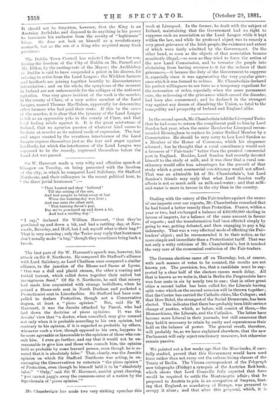The best part of Sir W. Harconrt's speech was, however,
his attack on Sir S. Northcote. He compared Sir Stafford's alliance with Lord Salisbury, as Lord Chatham once compared a similar alliance, to the junction of the Rhone and Saone at Lyons. " One was a dull and placid stream, the other a roaring and turbid torrent, which rolled down together their united but incongruous flood." Of Sir S. Northcote, he said that misery had made him acquainted with strange bedfellows, when he gained a Home-rule seat in North Durham and pocketed a Protectionist seat in Lincolnshire. Sir Stafford had been com- pelled to declare Protection, though not a Conservative
dogma, at least a "pious opinion." But, said Sir W. Harcourt, it was the Jesuits attacked by Pascal, who bad laid down the doctrine of pions opinions. It was the Jesuits' view that "a doctor, when consulted, may give counsel not only when it is probable according to his own opinion, but contrary to his opinion, if it is regarded as probable by others, whenever such a view, though opposed to his own, happens to be more agreeable or favourable to the opinions of those who con- sult him. I even go further, and say that it would not be un- reasonable to give him and those who consult him, the opinion held as probable by some learned person, even though he is as- sured that it is absolutely false." That, clearly, was the Jesuitic opinion on which Sir Stafford Northcote was acting, in en- couraging the Conservatives to entertain "the pious opinion" of Protection, even though he himself held it to be "absolutely false." "Only," said Sir W. Harcourt, amidst great cheering, "you cannot juggle away the common-sense of a nation by the legerdemain of pious opinion.'"


































 Previous page
Previous page